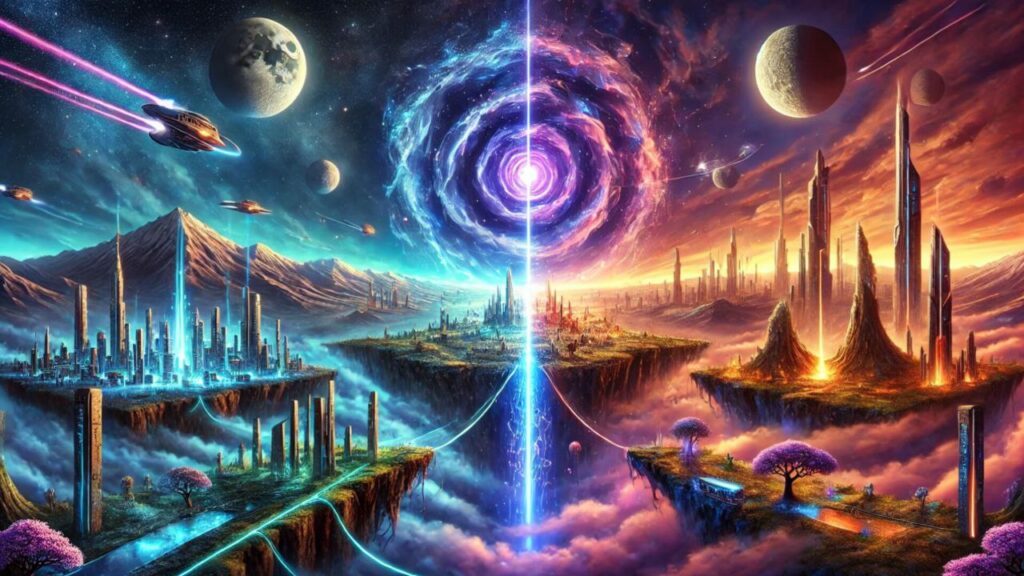If humans discovered a parallel universe, the consequences would ripple across science, philosophy, society, and even daily life, depending on the nature of the discovery and what that universe entails. Here’s a breakdown of what might happen, blending grounded reasoning with the speculative possibilities such a breakthrough could unleash.

Scientific Revolution
The moment a parallel universe is confirmed—say, through a breakthrough in quantum physics, a detectable signal from a collider experiment, or an anomaly in cosmic background radiation—science would explode with activity. Physicists would scramble to verify the evidence, likely using advanced tools like upgraded versions of the Large Hadron Collider or space telescopes.Theories like the multiverse hypothesis, rooted in string theory or quantum mechanics, would shift from speculation to fact, rewriting textbooks overnight. Questions about the universe’s boundaries, alternate physical laws, or even duplicate Earths would dominate research, sucking up funding and talent. Nobel Prizes would pile up as fast as new questions: Is it accessible? Does it mirror our physics? Could it explain dark matter or energy?
Technological Leap or Bust
If the parallel universe is reachable—maybe through a wormhole, a quantum portal, or some yet-to-be-invented tech—humanity might race to exploit it. Imagine governments and corporations pouring trillions into interdimensional travel, hoping to tap new resources, colonize alternate Earths, or dump waste where no one’s watching. Elon Musk might tweet about Tesla’s “Multiverse Roadster” while SpaceX pivots to “UniverseX.” But if it’s just observable, not touchable, the tech impact might stall at better telescopes or simulators, leaving practical applications decades away. Either way, the discovery would turbocharge AI and quantum computing efforts to model and interact with this new reality.
Also read: Welcome to the Future: 10 Mind-Blowing Concepts That Will Shape Tomorrow’s Cities!
Philosophical and Religious Upheaval
A parallel universe would hit human belief systems like a tsunami. Philosophers would debate identity: If there’s another “you” out there, are you still unique? Religions might split—some claiming it’s God’s broader creation, others calling it a test or heresy. Picture the Vatican issuing a statement: “Pope Francis welcomes parallel souls into the divine plan,” while skeptics argue it disproves a singular universe crafted for humanity. Existential crises would spike as people wonder if their choices matter in a multiverse where every outcome plays out elsewhere. Self-help books titled Finding Your Parallel Purpose would flood Amazon.
Also read: “The Secret Behind Saturn’s Stunning Rings Will Blow Your Mind”
Societal Shake-Up
The public’s reaction would swing wildly. Governments might classify details to avoid panic, but leaks would fuel conspiracy theories—“The elites are already living there!” Social media, especially platforms like X, would erupt with memes, hot takes, and fake “parallel universe selfies.” Activists might demand access rights, while doomsday preppers stockpile for an interdimensional invasion. Economies could wobble if markets bet big on multiverse tech, only to crash if it’s a dud. Education would shift too—kids learning “Multiverse Geography” alongside regular maps.
Contact Scenarios
If this universe has life—especially intelligent beings—everything escalates. Are they human duplicates, advanced aliens, or something unrecognizable? Communication attempts would start, maybe via radio signals or quantum entanglement, with linguists and cryptographers decoding their “hello.” Friendly contact could spark a cultural exchange—swapping art, tech, or warnings about shared threats like climate collapse. Hostile entities might trigger a global defense buildup, with NATO debating “Parallel Threat Protocols.” If it’s just barren or inaccessible, the focus stays on study, not showdowns.
Long-Term Wild Cards
Over decades, a parallel universe could redefine humanity’s trajectory. Energy from another dimension might solve climate change, or refugees might flee to an emptier Earth. But dangers loom—meddling could destabilize our universe’s physics, or an advanced civilization might see us as pests. Ethicists would wrestle with questions: Do we have the right to interfere? What if they’re better off without us? Sci-fi tropes like time loops or reality merges might even creep into serious debate.
In short, discovering a parallel universe would be a Pandora’s box—unleashing awe, chaos, and possibility. It’d force humanity to rethink everything from gravity to God, with outcomes ranging from a golden age of exploration to a humbling reminder of our cosmic smallness. What happens next depends on what we find—and how we handle the shock.
Also read: “How to Live on Mars: The Ultimate Guide to Surviving the Red Planet!”

